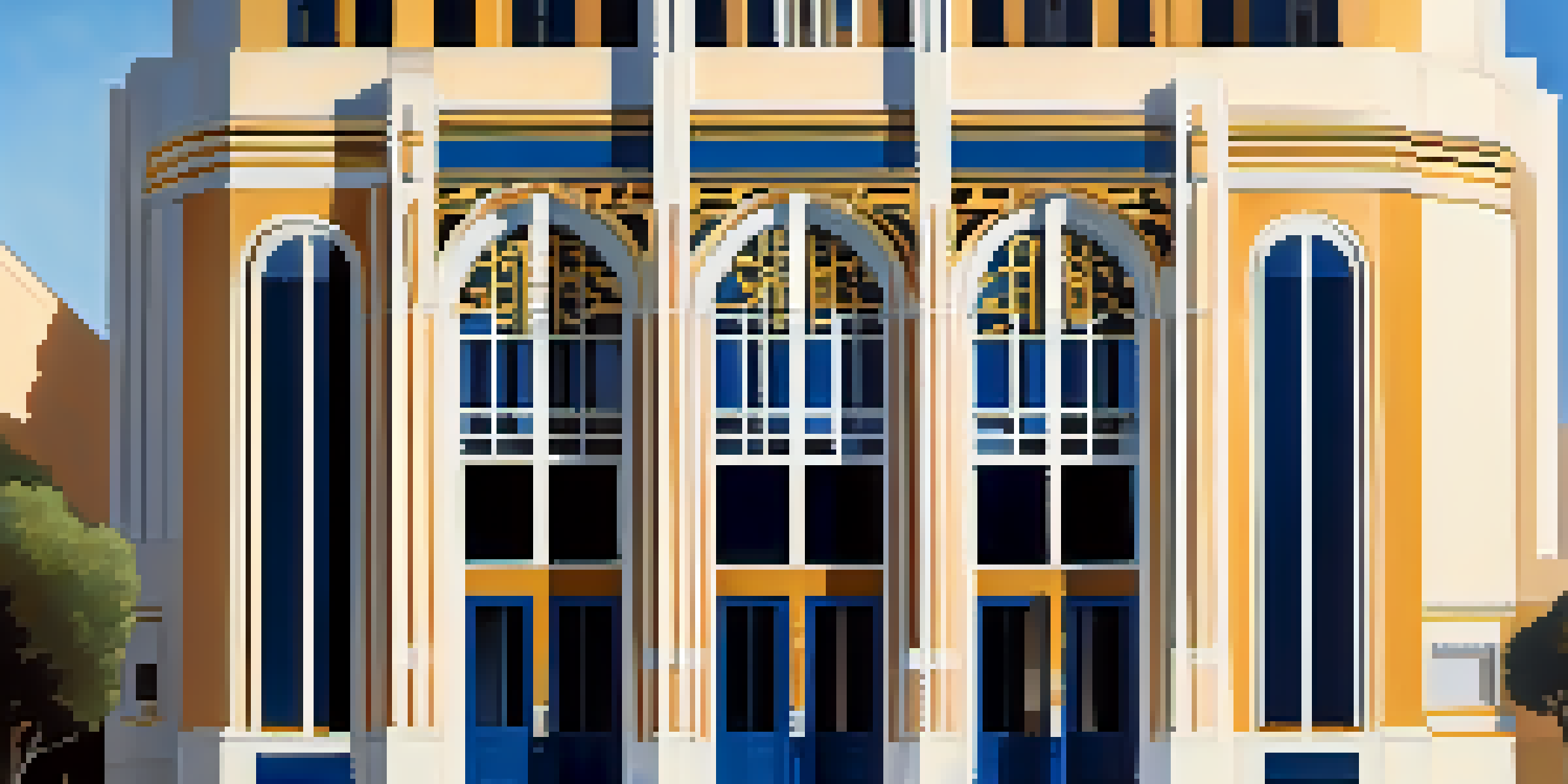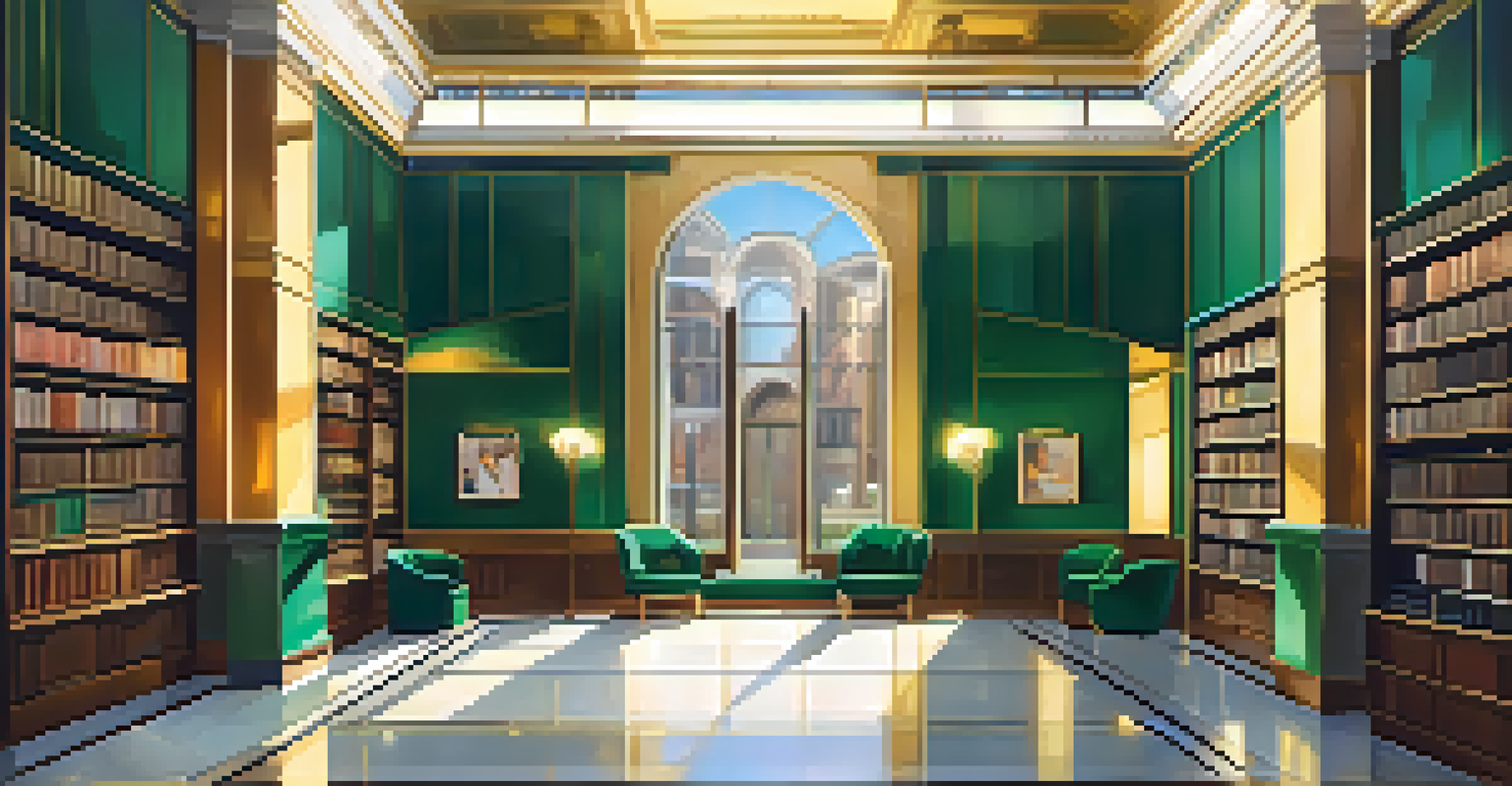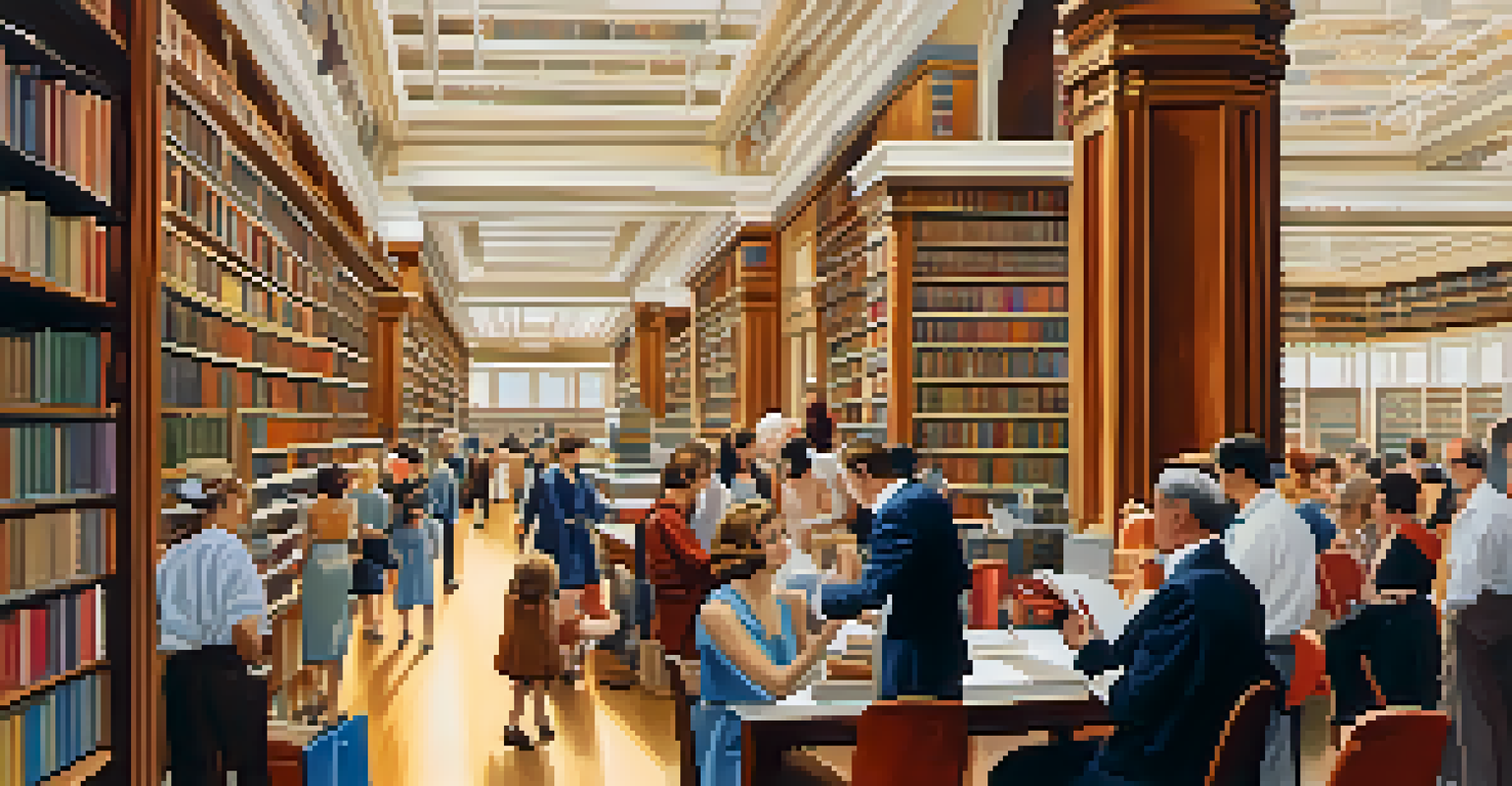Art Deco Elements in Pasadena's Historic Library Designs

Understanding Art Deco: A Brief Overview
Art Deco, a design style that emerged in the 1920s and 1930s, is characterized by its bold geometric shapes and vibrant colors. This movement represented luxury, glamour, and modernity, making it a popular choice for architectural designs. In Pasadena, the influence of Art Deco can be seen in several historic libraries, which exhibit these distinctive features.
Art Deco is a style that has a unique ability to blend the past with the future, creating a timeless elegance that resonates even today.
Often seen as a departure from the ornate designs of previous eras, Art Deco embraces simplicity while being visually striking. Think of it as the bridge between traditional styles and modernism, merging elegance with practicality. This unique blend is what makes Pasadena's libraries so fascinating to explore.
As we delve into the specific elements of Art Deco found in Pasadena's library designs, you'll see how this style not only enhances their aesthetic appeal but also reflects the cultural zeitgeist of the time. From intricate detailing to functional layouts, these libraries are treasures of architectural history.
Key Art Deco Features in Library Architecture
When you step into a library designed in the Art Deco style, you'll likely notice the use of geometric patterns and bold lines. These elements create a sense of movement and energy, inviting visitors to engage with their surroundings. For instance, the facades of these libraries often showcase zigzag motifs or chevrons, which are hallmark characteristics of the Art Deco style.

Another prominent feature is the use of materials such as marble, chrome, and glass. These materials not only lend a luxurious feel but also highlight the era's fascination with technology and innovation. Imagine walking through a library where the polished surfaces catch the light, creating a warm and welcoming atmosphere.
Art Deco Libraries Reflect Culture
Pasadena's Art Deco libraries embody the optimism and modernity of the 1920s and 1930s, serving as cultural landmarks that reflect the societal values of their time.
Moreover, the interiors often include stylized murals or decorative elements that tell a story, reflecting the cultural narratives of the time. These artistic touches serve as both decoration and inspiration, making the libraries not just places for books, but also centers for community and creativity.
The Role of Colors and Textures in Design
Color plays a crucial role in Art Deco designs, with libraries often featuring rich, bold hues such as deep blues, greens, and golds. These colors were chosen not just for their visual appeal but also for their ability to evoke a sense of sophistication and warmth. Picture a library where the walls are painted in a vibrant yet calming shade, creating an inviting environment for readers.
Architecture should speak of its time and place, but yearn for timelessness.
Textures are equally important, as they add depth and interest to the overall design. From smooth marble floors to textured wall panels, the variety of surfaces encourages exploration and enhances the sensory experience of the space. Imagine running your fingers over a beautifully crafted surface while browsing through the shelves.
In Pasadena's historic libraries, the interplay of color and texture reflects a commitment to creating spaces that are both functional and aesthetically pleasing. This thoughtful design approach not only enriches the visitor experience but also pays homage to the artistic values of the Art Deco era.
Iconic Pasadena Libraries Featuring Art Deco Design
Among Pasadena's historic libraries, the Central Library stands out as a prime example of Art Deco architecture. Completed in 1927, its striking exterior features geometric patterns and a stunning facade adorned with intricate details. As you approach this landmark, the elegance of its design immediately captivates your attention.
Another notable library is the McKinley School Library, which showcases Art Deco elements in its design and decor. The combination of bold lines and unique ornamentation reflects the style's influence while serving the needs of the community. Inside, you'll find a space that feels both timeless and modern, inviting readers of all ages to explore.
Preservation Efforts Are Vital
Community-driven initiatives are crucial for maintaining the architectural integrity of Pasadena's historic libraries, ensuring future generations can appreciate their beauty and significance.
These libraries not only serve as repositories of knowledge but also as cultural landmarks that embody the spirit of their time. By appreciating their architectural beauty, we can gain a deeper understanding of Pasadena's rich history and the lasting impact of the Art Deco movement.
The Cultural Significance of Art Deco Libraries
Art Deco libraries in Pasadena are more than just buildings; they represent a significant cultural movement. During a time when the world was recovering from war and economic hardships, this style emerged as a symbol of optimism and progress. These libraries, with their modern designs, became beacons of hope and knowledge for the community.
The architecture of these libraries often reflects the societal values of the era, emphasizing accessibility and community engagement. They were designed to be welcoming spaces where everyone could gather, learn, and grow. Imagine a bustling library filled with people, each discovering something new amidst the elegant surroundings.
Today, these historic structures continue to play a vital role in Pasadena's cultural landscape. They serve as reminders of the artistic achievements of the past, while still meeting the needs of the present. By preserving and celebrating these libraries, we honor the legacy of the Art Deco style and its impact on our communities.
Preservation Efforts for Historic Libraries
Preserving Pasadena's Art Deco libraries is a crucial endeavor that ensures future generations can appreciate their beauty and significance. Many organizations and community members are dedicated to maintaining these historic structures, recognizing their value as cultural treasures. Through restoration projects, these libraries are being updated while retaining their original charm.
These preservation efforts often involve careful research and planning to maintain the integrity of the design. For instance, restoring the original materials and colors requires a deep understanding of the Art Deco style and its historical context. This meticulous attention to detail ensures that the libraries remain true to their architectural roots.
Experience History Through Tours
Visiting Pasadena's Art Deco libraries offers a chance to engage with their rich history and design through guided tours and community events.
As a community, supporting these preservation initiatives not only protects our architectural heritage but also enriches our cultural identity. By visiting and using these libraries, residents actively contribute to their preservation, fostering a sense of pride and connection to Pasadena's history.
Visiting Pasadena's Art Deco Libraries Today
If you're eager to experience the charm of Pasadena's Art Deco libraries, there are several ways to engage with these historic spaces. Many libraries offer guided tours that delve into their architectural features and historical significance. These tours provide a unique opportunity to appreciate the artistry and craftsmanship that went into their design.
Additionally, many of these libraries host events, workshops, and exhibitions that celebrate local culture and creativity. Attending these events not only allows you to enjoy the library’s beauty but also connects you with the community. Imagine participating in a poetry reading surrounded by the stunning Art Deco details that inspire creativity.

Visiting Pasadena's historic libraries is not just about checking out books; it's about immersing yourself in a rich tapestry of history and design. By exploring these architectural gems, you'll gain a deeper appreciation for the Art Deco movement and its lasting impact on our community.